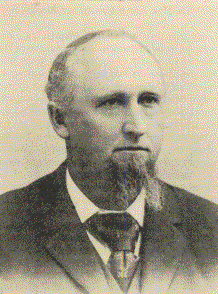John W. Leedy
| John W. Leedy | |
|---|---|
 |
|
| 14th Governor of Kansas | |
|
In office January 11, 1897 – January 9, 1899 |
|
| Lieutenant | Alexander Miller Harvey |
| Preceded by | Edmund N. Morrill |
| Succeeded by | William E. Stanley |
| Personal details | |
| Born | March 8, 1849 Richland County, Ohio |
| Died | March 24, 1935 (aged 86) Edmonton, Alberta |
| Political party | Populist |
| Spouse(s) | Sarah J. Boyd |
| Profession | clerk, farmer, miner |
| Religion | Church of the Brethren ("Dunkard") (preference) |
John Whitnah Leedy (March 8, 1849 – March 24, 1935) was the 14th Governor of Kansas.
He was born near Bellville, Ohio in Richland County to Samuel Keith and Margaret (Whitnah) Leedy, the fifth of six children. His parents were members of the Church of the Brethren (colloquially called "Tunkers" or "Dunkers" in the United States). Upon the death of his father in 1853, he went to work for neighbors as a farm hand. He was only able to briefly attend school during a few winters.
In 1863, Leedy attempted to join the Union Army, but was rejected because of his age and the intervention of his mother. But in 1864, he essentially ran away from home, following the 163rd Ohio Infantry in which his cousin Jacob M. Leedy was captain of Company D.
After the Civil War, Leedy moved to Princeton, Indiana where he served as a clerk in a store for three years. His health in decline, Leedy then moved to Carlinville, Illinois and sought work as a farm hand. He worked for Squire Gore (later state auditor of Illinois), and within five years his health had returned and he had saved enough money to purchase his own farm. He married Sarah Jane Boyd (1851–1940) in 1874 and had three children: Clara Romaine (1876–1972), Alice May (1880–1964), and John Boyd (1880–1968).
Leedy moved to Coffey County, Kansas near Le Roy in 1880, where he purchased land for a farm. His interest turned to horse breeding and was known as a successful breeder. However, in 1890, his finances began to fail and during the Panic of 1893, Leedy was forced to turn over his farm and all improvements—including his home—to his creditors.
...
Wikipedia
